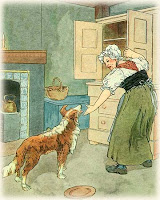Sharon, my neighbor, sent me a link to a blog for language lovers that is published by Collins Dictionary. It includes help for people learning English. That day, the latest blog post was about these three similar words: cupboard, wardrobe, and closet.
1. "Cupboards in American English are built-in shelves behind doors. They are mainly found in kitchens." My own example: When the pandemic kept me from regular grocery shopping, I stocked my kitchen cupboard with canned goods, like soups, vegetables, chicken, tuna, and peanut butter. But now we have another word dilemma — or at least, I do. I know the word "cupboard" primarily from the nursery rhyme I learned as a child:
"Old Mother Hubbardwent to the cupboardto get her poor doggie a bone;but when she got there,the cupboard was bare,and so the poor doggie had none."
We always referred to the shelves in our kitchen as cabinets. In other words, if I had told anyone that I'd collected those cans of food, I'd have said I put them in my kitchen cabinet. I rarely use the word cupboard.
2. "A wardrobe is a tall piece of furniture, usually in a bedroom, that has space for hanging clothes." My example: I remember having a wardrobe when I was growing up. It looked sort of like this illustration I found online, but mine was light-colored and child-sized. My cat Duchess had a litter of kittens on my underwear in one of the drawers. It was probably the most comfortable place she could find, and I had most likely left the doors open. I have no idea what happened to that wardrobe from my childhood. Today, all my clothes are in my bedroom closet (see definition #3 below).
And to take this a bit further, what about the word chifforobe? Actually, that's what we called that thing that held my clothes as a child. Duchess had her kittens on top of my underwear in the chifforobe. Wikipedia has information that I've edited for space:
A chifforobe (/ˈʃɪfəˌroʊb/), also chiffarobe or chifferobe, is a closet-like piece of furniture that combines a long space for hanging clothes (that is, a wardrobe or armoire) with a chest of drawers. Typically the wardrobe section runs down one side of the piece, while the drawers occupy the other side. [Mine had two doors, so we could open one side or the other or both.] ... Chifforobes were advertised in the 1908 Sears, Roebuck Catalog, which described them as "a modern invention." ... The word is used in the United States, primarily in the southern portion of the country...
Yes, I'm from the South, so what can I say? And I was a child in the 1940s and 1950s. It's complicated, isn't it? So was half of my chifforobe a wardrobe and the other half a closet? Okay, it's time for that third definition.
I did finally get a photo of her walking into the closet, just to prove she can. I leave part of the floor in there cleared out, just for her. She never stays inside the closet, just goes in and right back out. But she knows how and likes to remind herself that she can easily do it. (Hmm, does posting about Clawdia make this a Caturday post? Sure, why not? We now have a Caturday in the middle of the week.)
So after all this word study, what did I do? I subscribed to the newsletter from Collins Dictionary and discovered it's from HarperCollins UK. That "UK" explains a lot, right there. If you are interested, I think you can sign up at the bottom of any page on the blog. And it has free online dictionary, thesaurus, and reference materials. Maybe I should also mention their Wordle helper.







No comments:
Post a Comment
Comments are moderated before being published.